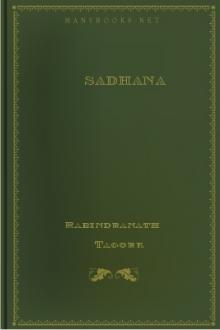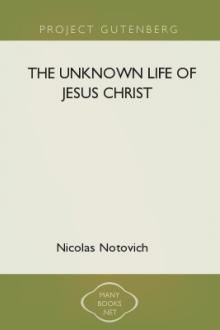Sadhana - Rabindranath Tagore (book club suggestions txt) 📗

- Author: Rabindranath Tagore
- Performer: -
Book online «Sadhana - Rabindranath Tagore (book club suggestions txt) 📗». Author Rabindranath Tagore
We have a glimpse of the same truth in the teachings of Jesus when he says, “It is easier for a camel to pass through the eye of a needle than for a rich man to enter the kingdom of Heaven”—
which implies that whatever we treasure for ourselves separates us from others; our possessions are our limitations. He who is bent upon accumulating riches is unable, with his ego continually bulging, to pass through the gates of comprehension of the spiritual world, which is the world of perfect harmony; he is shut up within the narrow walls of his limited acquisitions.
Hence the spirit of the teachings of Upanishad is: In order to find him you must embrace all. In the pursuit of wealth you really give up everything to gain a few things, and that is not the way to attain him who is completeness.
Some modern philosophers of Europe, who are directly or indirectly indebted to the Upanishads, far from realising their debt, maintain that the Brahma of India is a mere abstraction, a negation of all that is in the world. In a word, that the Infinite Being is to be found nowhere except in metaphysics. It may be, that such a doctrine has been and still is prevalent with a section of our countrymen. But this is certainly not in accord with the pervading spirit of the Indian mind. Instead, it is the practice of realising and affirming the presence of the infinite in all things which has been its constant inspiration.
We are enjoined to see whatever there is in the world as being enveloped by God.
[Footnote: Icavasyamidam sarvam yat kincha jagatyan jagat.]
I bow to God over and over again who is in fire and in water, who permeates the whole world, who is in the annual crops as well as in the perennial trees. [Footnote: Yo devo’gnau y’opsu y’o vicvambhuvanamaviveca ya oshadhishu yo vanaspatishu tasmai devaya namonamah.]
Can this be God abstracted from the world? Instead, it signifies not merely seeing him in all things, but saluting him in all the objects of the world. The attitude of the God-conscious man of the Upanishad towards the universe is one of a deep feeling of adoration. His object of worship is present everywhere. It is the one living truth that makes all realities true. This truth is not only of knowledge but of devotion. ‘Namonamah,’—we bow to him everywhere, and over and over again. It is recognised in the outburst of the Rishi, who addresses the whole world in a sudden ecstasy of joy: Listen to me, ye sons of the immortal spirit, ye who live in the heavenly abode, I have known the Supreme Person whose light shines forth from beyond the darkness.
[Footnote: Crinvantu vicve amritasya putra a ye divya dhamani tasthuh vedahametam purusham mahantam aditya varnam tamasah parastat.] Do we not find the overwhelming delight of a direct and positive experience where there is not the least trace of vagueness or passivity?
Buddha who developed the practical side of the teaching of Upanishads, preached the same message when he said, With everything, whether it is above or below, remote or near, visible or invisible, thou shalt preserve a relation of unlimited love without any animosity or without a desire to kill. To live in such a consciousness while standing or walking, sitting or lying down till you are asleep, is Brahma vihara, or, in other words, is living and moving and having your joy in the spirit of Brahma.
What is that spirit? The Upanishad says, The being who is in his essence the light and life of all, who is world-conscious, is Brahma. [Footnote: Yacchayamasminnakace tejomayo’mritamayah purushah sarvanubhuh.] To feel all, to be conscious of everything, is his spirit. We are immersed in his consciousness body and soul. It is through his consciousness that the sun attracts the earth; it is through his consciousness that the light-waves are being transmitted from planet to planet.
Not only in space, but this light and life, this all-feeling being is in our souls. [Footnote: Yacchayamasminnatmani tejomayo’mritamayah purushah sarvanubhuh.] He is all-conscious in space, or the world of extension; and he is all-conscious in soul, or the world of intension.
Thus to attain our world-consciousness, we have to unite our feeling with this all-pervasive infinite feeling. In fact, the only true human progress is coincident with this widening of the range of feeling. All our poetry, philosophy, science, art and religion are serving to extend the scope of our consciousness towards higher and larger spheres. Man does not acquire rights through occupation of larger space, nor through external conduct, but his rights extend only so far as he is real, and his reality is measured by the scope of his consciousness.
We have, however, to pay a price for this attainment of the freedom of consciousness. What is the price? It is to give one’s self away. Our soul can realise itself truly only by denying itself. The Upanishad says, Thou shalt gain by giving away [Footnote: Tyaktena bhunjithah], Thou shalt not covet.
[Footnote: Ma gridhah]
In Gita we are advised to work disinterestedly, abandoning all lust for the result. Many outsiders conclude from this teaching that the conception of the world as something unreal lies at the root of the so-called disinterestedness preached in India. But the reverse is true.
The man who aims at his own aggrandisement underrates everything else. Compared to his ego the rest of the world is unreal. Thus in order to be fully conscious of the reality of all, one has to be free himself from the bonds of personal desires. This discipline we have to go through to prepare ourselves for our social duties—for sharing the burdens of our fellow-beings.
Every endeavour to attain a larger life requires of man “to gain by giving away, and not to be greedy.” And thus to expand gradually the consciousness of one’s unity with all is the striving of humanity.
The Infinite in India was not a thin nonentity, void of all content. The Rishis of India asserted emphatically, “To know him in this life is to be true; not to know him in this life is the desolation of death.” [Footnote: Iha chet avedit atha satyamasti, nachet iha avedit mahati vinashtih.] How to know him then? “By realising him in each and all.” [Footnote: Bhuteshu bhuteshu vichintva.] Not only in nature but in the family, in society, and in the state, the more we realise the World-conscious in all, the better for us. Failing to realise it, we turn our faces to destruction.
It fills me with great joy and a high hope for the future of humanity when I realise that there was a time in the remote past when our poet-prophets stood under the lavish sunshine of an Indian sky and greeted the world with the glad recognition of kindred. It was not an anthropomorphic hallucination. It was not seeing man reflected everywhere in grotesquely exaggerated images, and witnessing the human drama acted on a gigantic scale in nature’s arena of flitting lights and shadows. On the contrary, it meant crossing the limiting barriers of the individual, to become more than man, to become one with the All.
It was not a mere play of the imagination, but it was the liberation of consciousness from all the mystifications and exaggerations of the self. These ancient seers felt in the serene depth of their mind that the same energy which vibrates and passes into the endless forms of the world manifests itself in our inner being as consciousness; and there is no break in unity. For these seers there was no gap in their luminous vision of perfection. They never acknowledged even death itself as creating a chasm in the field of reality. They said, His reflection is death as well as immortality. [Footnote: Yasya chhayamritam yasya mrityuh.] They did not recognise any essential opposition between life and death, and they said with absolute assurance, “It is life that is death.” [Footnote: Prano mrityuh.] They saluted with the same serenity of gladness “life in its aspect of appearing and in its aspect of departure”—
That which is past is hidden in life, and that which is to come.
[Footnote: Namo astu ayate namo astu parayate. Prane ha bhutam bhavyancha.] They knew that mere appearance and disappearance are on the surface like waves on the sea, but life which is permanent knows no decay or diminution.
Everything has sprung from immortal life and is vibrating with life, [Footnote: Yadidan kincha prana ejati nihsritam.] for life is immense. [Footnote: Prano virat.]
This is the noble heritage from our forefathers waiting to be claimed by us as our own, this ideal of the supreme freedom of consciousness. It is not merely intellectual or emotional, it has an ethical basis, and it must be translated into action. In the Upanishad it is said, The supreme being is all-pervading, therefore he is the innate good in all. [Footnote: Sarvavyapi sa bhagavan tasmat sarvagatah civah.] To be truly united in knowledge, love, and service with all beings, and thus to realise one’s self in the all-pervading God is the essence of goodness, and this is the keynote of the teachings of the Upanishads: Life is immense! [Footnote: Prano virat.]
II SOUL CONSCIOUSNESSWe have seen that it was the aspiration of ancient India to live and move and have its joy in Brahma, the all-conscious and all-pervading Spirit, by extending its field of consciousness over all the world. But that, it may be urged, is an impossible task for man to achieve. If this extension of consciousness be an outward process, then it is endless; it is like attempting to cross the ocean after ladling out its water. By beginning to try to realise all, one has to end by realising nothing.
But, in reality, it is not so absurd as it sounds. Man has every day to solve this problem of enlarging his region and adjusting his burdens. His burdens are many, too numerous for him to carry, but he knows that by adopting a system he can lighten the weight of his load. Whenever they feel too complicated and unwieldy, he knows it is because he has not been able to hit upon the system which would have set everything in place and distributed the weight evenly. This search for system is really a search for unity, for synthesis; it is our attempt to harmonise the heterogeneous complexity of outward materials by an inner adjustment. In the search we gradually become aware that to find out the One is to possess the All; that there, indeed, is our last and highest privilege. It is based on the law of that unity which is, if we only know it, our abiding strength. Its living principle is the power that is in truth; the truth of that unity which comprehends multiplicity. Facts are many, but the truth is one. The animal intelligence knows facts, the human mind has power to apprehend truth. The apple falls from





Comments (0)